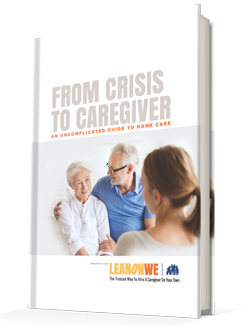How to Make Your Senior's Home Safe After a Hospital Visit

Many families don’t realize how much a loved one’s health has deteriorated until a fall lands them in the hospital.
According to the CDC, falls are the leading cause of injury for adults aged 65 and older, and as many as 1 in 4 older adults report falling each year. The injuries resulting from a fall can dramatically alter a senior’s quality of life, especially if they wish to remain at home.
The good news is that many falls can be prevented with simple home improvements. Since seniors are particularly susceptible to falling after a hospital visit, it’s especially important to make their home as safe as possible upon discharge. In this guide, we’ll show you how to help Mom or Dad get safely home and mitigate the risk of injury.
» Need help finding care for your loved one? Download our free guide, "From Crisis to Caregiver."
Fall-Proof Your Parent’s Home Before Their Return
Most falls happen in the course of everyday activities. We’ve talked about bathroom safety before, but you’ll also want to fall-proof other high-traffic areas:
- Keep floors clear: Be sure to pick up clutter, secure loose rugs, keep electrical cords tucked away, and arrange furniture so that it doesn’t extend into walkways. It’s also a good idea to remove any raised thresholds in the house.
- Ensure adequate lighting: Make sure there’s a light switch near the bedroom door and another switch or a lamp by the bed, so your parent won’t have to walk across a dark room. Also, use nightlights in the halls and bathroom. Those with daylight or motion sensors are an especially good choice, since no one has to remember to turn them on.
- Make stairs safe: Sturdy handrails are essential, but you’ll also want to discourage your senior from carrying things up and down the stairs. When that’s unavoidable, your parent should hold the item in one hand and the rail in the other. (A reminder never hurts.)
Check out our home safety checklist for more tips like these.
Provide Assistance After Release
Once Mom returns home from a hospital or rehab stay, make sure she eases back into the new environment.
Returning home can be disorienting for many seniors; after a hospital stay, seniors are typically weak and deconditioned from spending so much time in bed, and certain medications may cause balance/cognitive problems.
Once home, your mother or father may be eager to be independent and rush into old routines and activities, but may not be prepared to handle these things on their own. Though many seniors are reluctant to ask for help out of fear of being perceived as a burden, this is a critical time to support your loved one. During a hospital stay, patients depend on the staff for help with dressing, toileting, and bathing. At least in the first few days at home, they’ll likely need similar care.
You may want to provide some or all of this care yourself, but an in-home caregiver is also a great fit in this situation.
An in-home caregiver could be hired for support immediately after returning home, and gradually decrease hours as your parent gets better and feels more comfortable. We strongly recommend considering overnight care at the beginning, as many newly discharged patients may become disoriented after waking up to use the bathroom or navigate their home in the dark.
Keep Your Senior Active To Prevent Future Falls
While it’s important to not stress your loved one too much, they must stay active within reason when returning home.
Make sure they jump back into physical and social activities as soon as possible after a hospital visit. Encourage friends and family to stop by or, if possible, take your parent out.
Work with her doctor to address any problems associated with vision, hearing, or medication, since these can affect balance. Also, help him incorporate physical exercise into a daily routine. Simple activities that increase strength, range of motion, and balance can prevent future falls.
Even if your senior has already taken a fall, there are many things you can do to avoid additional falls, more serious injuries, and lengthier hospital visits.
Struggling To Find Help For Your Loved One? Download Our Free Homecare Guide
Finding quality care to ensure the safety and happiness of your loved one can be challenging, but it’s not impossible. We’ve helped 2,000+ families hire the right caregiver for their loved ones, and we compiled everything we know into a free eBook.
Our complimentary eBook has all the information you need for an overview of home care, learning how to hire, finding ways to overcome challenges you may encounter, and much more. Download “From Crises to Caregiver: An Uncomplicated Guide to Home Care” today.

